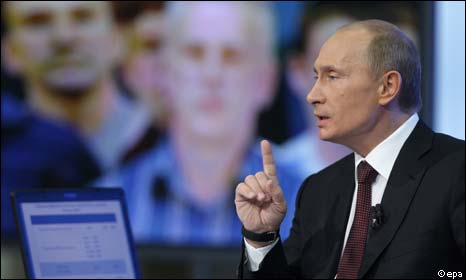|
‘Good tsar’ Putin revels in TV role
Charles Clover,
Financial Times
3 December, 2009
Russia

Vladimir Putin appears live on national Russian television in four-hour marathon
Vladimir Putin, Russia’s prime minister, offered his opinion on everything from the legacy of Joseph Stalin to how to pronounce the word yoghurt on Thursday in a four-hour call-in show that has become one of the annual staples of the Russian political scene.
In a bravura performance, Mr Putin reinforced his stature as Russia’s hegemonic political figure at a time when he appears to be facing criticism from his friend and protégé, Dmitry Medvedev, president, who casts himself as a comparative liberal.
Mr Putin made it clear on Thursday that he had no intention of leaving the political scene. “Don’t hold your breath,” he said in response to a caller asking this question.
The call-in show, which Mr Putin does once a year, reinforces his status as a man of the people, a “good tsar” in the words of one Moscow political expert, capable of resolving every issue, no matter how small. Callers phone in from across Russia’s 11 time zones, and no request is deemed too insignificant, especially if it plays well with pollsters.
He offered to help one caller find a job, gave advice on the minutiae of a pension application to another, in addition to discussing Iran’s nuclear capability, international terrorism and Russia’s economic prospects.
Mr. Putin clearly pitched his answers at a particular demographic – the so-called “Putin Majority”, which sociologists identify as Russia’s lower and middle income voters who watch four hours or more of television each day. Playing to this audience, Mr Putin singled out the wealthy for criticism following a scandal last month in Switzerland, when Russian youths crashed two expensive sports cars near Lake Geneva, injuring a 70-year-old pensioner.
“In the Soviet times, some of our rich showed off their wealth by having gold teeth put in, preferably at the front.
“The Lamborghinis and other pricey knickknacks – they are simply today’s gold teeth which are shown off to everybody,” he said.
He was also asked about a controversial change to Russian pronunciation. “Do you drink yoghurt [accented first syllable] or yoghurt [accent on second]?” asked the caller. “Neither one, I drink Kefir,” said Mr Putin, scoffing at foreign fermented milk drinks in favour of native Russian fare.
Mr Putin’s knack for people politics, performing on TV in particular, is without doubt unique among his Soviet-era peers. Despite his background in the KGB, he has made the transition to television personality seem effortless. “He has the rating of a pop star or a sports hero,” said Gleb Pavlovsky, a top political consultant, in an interview earlier this year.
His popularity rating hovers between 55 per cent and 70 per cent, dented slightly in recent weeks by the economic crisis. Mr Medvedev trails by six to 10 points.
On the controversial topic of Stalin, the former Soviet dictator who sent millions to their deaths in the infamous Gulags, Mr Putin said: “It is impossible to make a general judgment. It is evident that, from 1924 to 1953, the country that Stalin ruled changed from an agrarian to an industrial society.”
However, he added: “The positives that undoubtedly existed were achieved at an unacceptable price. Repressions did take place. This is a fact. Millions of our fellow citizens suffered.”
More
Information on World Elder Rights Issues
Copyright © Global Action on Aging
Terms of Use |
Privacy Policy | Contact
Us
|



